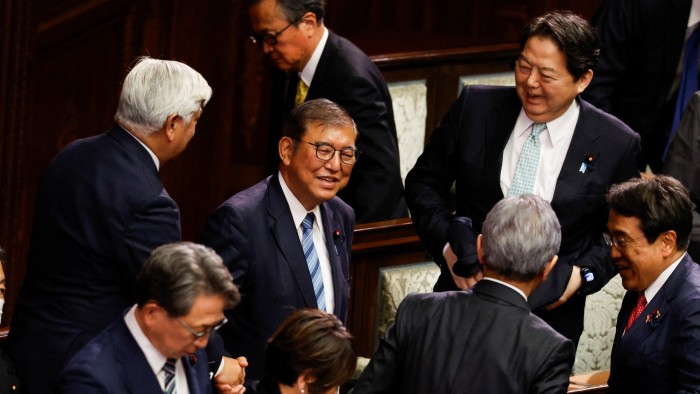Unlock the Editor’s Digest for free
Roula Khalaf, Editor of the FT, selects her favourite stories in this weekly newsletter.
Shigeru Ishiba has been confirmed as Japan’s prime minister, winning a vote in parliament despite a general election defeat that leaves him as one of the country’s weakest leaders in decades.
Ishiba beat his main opponent, opposition leader Yoshihiko Noda, in a rare run-off vote among MPs on Monday. Ishiba’s Liberal Democratic party lost its parliamentary majority in October’s election, leaving it dependent on the acquiescence of small opposition parties to govern the second-largest G7 economy.
The election outcome was a huge setback for Ishiba, who called the snap poll after he won a party leadership contest. It leaves Japan with a fragile government at a time of mounting geopolitical and economic uncertainty, including regional tensions, a change of US presidency, a weakened yen and the Bank of Japan’s attempt to normalise monetary policy after the end of negative interest rates.
In addition to reforming his cabinet, one of Ishiba’s priorities will be to secure a meeting with US president-elect Donald Trump — an encounter expected to take place later this month and already the subject of intensive planning by Japanese diplomats. The US is Japan’s most important ally.
Ishiba’s narrow confirmation by parliament depended in large part on the co-operation of the centre-right Democratic Party for the People, whose leader, Yoichiro Tamaki, emerged from Japan’s recent political chaos as a surprise kingmaker.
Hours before the parliamentary vote, Tamaki admitted that details of a tabloid story about an extramarital affair with a model were “basically correct”. He has resisted calls to step down as party leader.
The LDP has governed Japan for most of the postwar period and used its large majority in both houses of parliament to push economic reforms known as “Abenomics”, after late prime minister Shinzo Abe.
The reforms included a push for stronger standards of corporate governance and investor stewardship, both of which continue to be a major draw for foreign investors in Japan.
However, many Japanese appear to have rejected the LDP, dismayed by the rising cost of living and slow wage growth as well as by a party funding scandal.
The election produced a big swing away from the LDP and towards Noda’s Constitutional Democratic Party of Japan, creating a hung parliament.
Although Ishiba was able to make it through Monday’s election as prime minister, he now has a budget to pass and other measures to address the economic concerns of voters, all of which must now be negotiated with the DPP on a vote-by-vote basis.
Read the full article here




